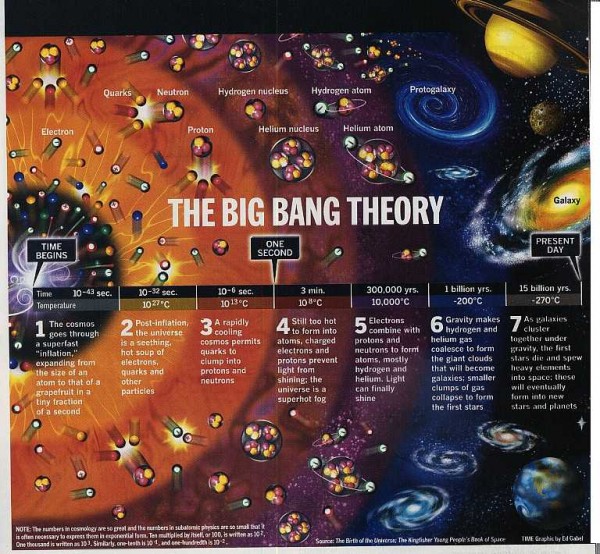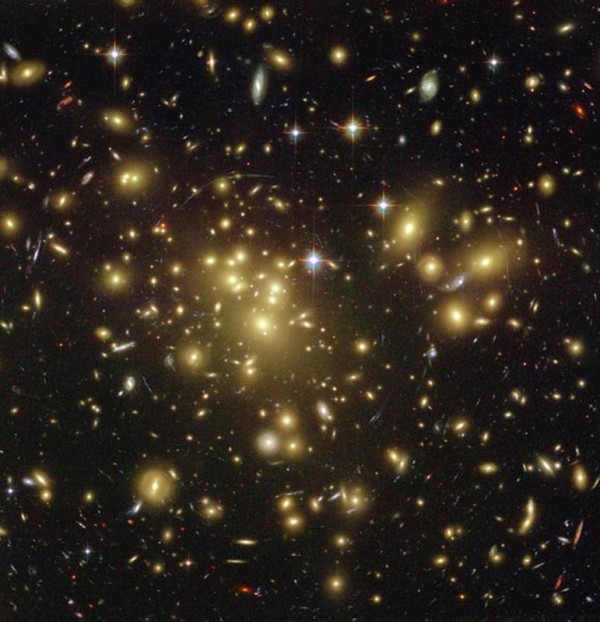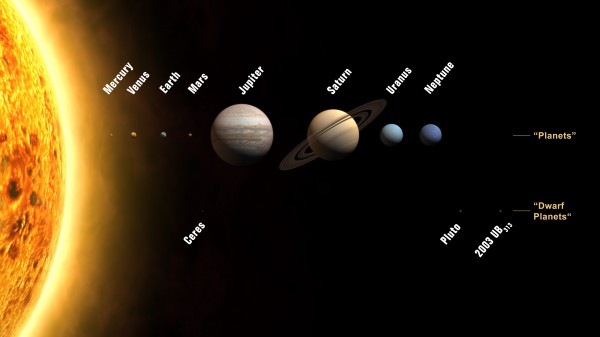Science has its roots in some basic laws that govern more complex concepts. Science works in an orderly manner and although it may seem quite haphazard if you break it down, it always come down to scientific laws and theories. Some of you might ask the question, what is the difference between a scientific law and scientific theory. A scientific law can be stated via mathematical statement and is usually valid for a given set of conditions, whereas, a scientific theory is in essence a statement about how the nature works and it’s not always possible to present it in the form of a mathematical statement. What we have for you is a collection of top 10 scientific laws and theories which, whether you are a scientist or not, you really should know. We’ll try to keep it less boring than your regular physics class!
10. Big Bang Theory
 Most of us are familiar with the Big Bang Theory and the sheer laughter it provides us, however, when it gets scientific, it gets different than your average sitcom. Big Bang Theory tries to explain how the universe came into being and how is it progressing. In layman’s words; our universe was just a point that contained all of the universe matter within it, until it exploded with a big bang (hence the name) and the universe came into existence. It is due to the effect of this bang that our universe is still expanding outward. This happened approximately 14 billion years ago. The theory gained further support when two astronomers’ found cosmic microwave background radiation in 1965 and after collaborating with a Princeton researcher, came to the conclusion that these radiations are a result of the Big Bang and are spread throughout the universe.
Most of us are familiar with the Big Bang Theory and the sheer laughter it provides us, however, when it gets scientific, it gets different than your average sitcom. Big Bang Theory tries to explain how the universe came into being and how is it progressing. In layman’s words; our universe was just a point that contained all of the universe matter within it, until it exploded with a big bang (hence the name) and the universe came into existence. It is due to the effect of this bang that our universe is still expanding outward. This happened approximately 14 billion years ago. The theory gained further support when two astronomers’ found cosmic microwave background radiation in 1965 and after collaborating with a Princeton researcher, came to the conclusion that these radiations are a result of the Big Bang and are spread throughout the universe.
[youtube]http://youtu.be/gs-yWMuBNr4[/youtube]
9. Hubble’s Law of Cosmic Expansion
 Even the Great Depression was not able to stop this man from accomplishing his dream. Edwin Hubble in the 1920s was working to come up with Hubble’s Law of Cosmic Expansion. He proved the existence of galaxies other than Milky Way and he also made a discovery which concurred with Big Bang Theory; galaxies are moving away from our own and named the phenomenon as recession. Quantifying the velocity of this movement resulted in Hubble’s Law of Cosmic Expansion which can be stated as velocity=Ho x distance. Velocity is the galaxy’s recessional velocity and Ho is the Hubble’s constant. Oh yes, we forgot the distance, distance is the galaxy’s distance from the one it is being compared to. This law provides a rather simple and concise method for measuring a galaxy’s velocity in relation to any other and it gave further proof that there are other galaxies.
Even the Great Depression was not able to stop this man from accomplishing his dream. Edwin Hubble in the 1920s was working to come up with Hubble’s Law of Cosmic Expansion. He proved the existence of galaxies other than Milky Way and he also made a discovery which concurred with Big Bang Theory; galaxies are moving away from our own and named the phenomenon as recession. Quantifying the velocity of this movement resulted in Hubble’s Law of Cosmic Expansion which can be stated as velocity=Ho x distance. Velocity is the galaxy’s recessional velocity and Ho is the Hubble’s constant. Oh yes, we forgot the distance, distance is the galaxy’s distance from the one it is being compared to. This law provides a rather simple and concise method for measuring a galaxy’s velocity in relation to any other and it gave further proof that there are other galaxies.
[youtube]http://www.youtube.com/watch?v=Rnu9gJCpf4E[/youtube]
8. Kepler’s Laws of Planetary Motion
 Scientists went on a cold war with religious leaders of their times for these laws. Believe us when we tell you this, for them the idea that earth orbits the sun and not the other way around was far too much to take in. Johannes Kepler, founding his work on research of Tyco Brahe and others, came up with a solid scientific foundation for the planets’ movements and presented them in the form of his famous three laws; law of orbits, law of areas and law of periods.
Scientists went on a cold war with religious leaders of their times for these laws. Believe us when we tell you this, for them the idea that earth orbits the sun and not the other way around was far too much to take in. Johannes Kepler, founding his work on research of Tyco Brahe and others, came up with a solid scientific foundation for the planets’ movements and presented them in the form of his famous three laws; law of orbits, law of areas and law of periods.
Let’s start off with the law of orbits. The law states that all planets orbit the sun elliptically. Law of areas states that if you connect a planet and sun with a line, then the area covered by that line over a given time interval would be equal no matter where the planet is when the measurements begin. Law of periods is the relation between planet’s distance from the sun and its orbital period. How it helps? Well, it proves, scientifically, that further the planet is from the sun the longer will be its orbital period.
[youtube]http://www.youtube.com/watch?v=GcKiG-CuvtA[/youtube]


